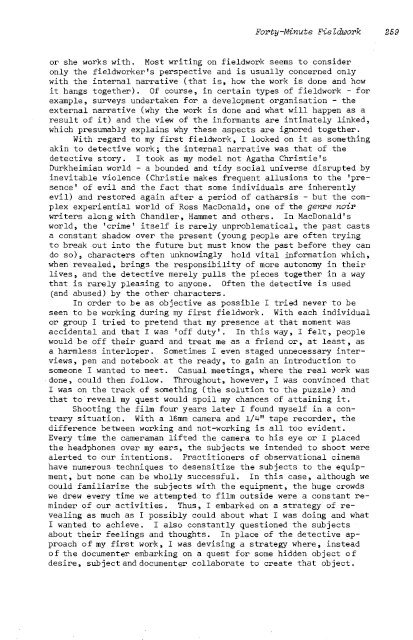CONTENTS NO.I - Institute of Social and Cultural Anthropology ...
CONTENTS NO.I - Institute of Social and Cultural Anthropology ...
CONTENTS NO.I - Institute of Social and Cultural Anthropology ...
You also want an ePaper? Increase the reach of your titles
YUMPU automatically turns print PDFs into web optimized ePapers that Google loves.
Forty-Minute Fieldwork 259<br />
or she works with. Most writing on fieldwork seems to consider<br />
only the fieldworker's perspective <strong>and</strong> is usually concerned only<br />
with the internal narrative (that is, how the work is done <strong>and</strong> how<br />
it hangs together). Of course, in certain types <strong>of</strong> fieldwork - for<br />
example, surveys undertaken for a development organisation - the<br />
external narrative (why the work is done <strong>and</strong> what will happen as a<br />
result <strong>of</strong> it) <strong>and</strong> the view <strong>of</strong> the informants are intimately linked,<br />
which presumably explains why these aspects are ignored together.<br />
With regard to my first fieldwork, I looked on it as something<br />
akin to detective work; the internal narrative was that <strong>of</strong> the<br />
detective story. I took as my model not Agatha Christie's<br />
Durkheimian world - a bounded <strong>and</strong> tidy social universe disrupted by<br />
inevitable violence (Christie makes frequent allusions to the 'presence'<br />
<strong>of</strong> evil <strong>and</strong> the fact that some individuals are inherently<br />
evil) <strong>and</strong> restored again after a period <strong>of</strong> catharsis - but the complex<br />
experiential world <strong>of</strong> Ross MacDonald, one <strong>of</strong> the genre noir<br />
writers along with Ch<strong>and</strong>ler, Hammet <strong>and</strong> others. In MacDonald's<br />
world, the 'crime' itself is rarely unproblematical, the past casts<br />
a constant shadow over the present (young people are <strong>of</strong>ten trying<br />
to break out into the future but must know the past before they can<br />
do so), characters <strong>of</strong>ten unknowingly hold vital information which,<br />
when revealed, brings the responsibility <strong>of</strong> more autonomy in their<br />
lives, <strong>and</strong> the detective merely pulls the pieces together in a way<br />
that is rarely pleasing to anyone. Often the detective is used<br />
(<strong>and</strong> abused) by the other characters.<br />
In order to be as objective as possible I tried never to be<br />
seen to be working during my first fieldwork. With each individual<br />
or group I tried to pretend that my presence at that moment was<br />
accidental <strong>and</strong> that I was '<strong>of</strong>f duty'. In this way, I felt, people<br />
would be <strong>of</strong>f their guard <strong>and</strong> treat me as a friend or, at least, as<br />
a harmless interloper. Sometimes I even staged unnecessary interviews,<br />
pen <strong>and</strong> notebook at the ready, to gain an introduction to<br />
someone I wanted to meet. Casual meetings, where the real work was<br />
,done, could then follow. Throughout, however, I was convinced that<br />
I was on the track <strong>of</strong> something (the solution to the puzzle) <strong>and</strong><br />
that to reveal my quest would spoil my chances <strong>of</strong> attaining it.<br />
Shooting the film four years later I found myself in a contrary<br />
situation. With a 16mm camera <strong>and</strong> 1/4" tape recorder, the<br />
difference between working <strong>and</strong> not-working is all too evident.<br />
Every time the cameraman lifted the camera to his eye or I placed<br />
the headphones over my ears, the subjects we intended to shoot were<br />
alerted to our intentions. Practitioners <strong>of</strong> observational cinema<br />
have numerous techniques to desensitize the subjects to the equipment,<br />
but none can be wholly successful. In this case, although we<br />
could familiarize the subjects with the equipment, the huge crowds<br />
we drew every time we attempted to film outside were a constant reminder<br />
<strong>of</strong> our activities. Thus, I embarked on a strategy <strong>of</strong> revealing<br />
as much as I possibly could about what I was doing <strong>and</strong> what<br />
I wanted to achieve. I also constantly questioned the subjects<br />
about their feelings <strong>and</strong> thoughts. In place <strong>of</strong> the detective approach<br />
<strong>of</strong> my first work, I was devising a strategy where, instead<br />
<strong>of</strong> the documentar embarking on a quest for some hidden object <strong>of</strong><br />
desire, subject <strong>and</strong> document er collaborate to create that object.

















